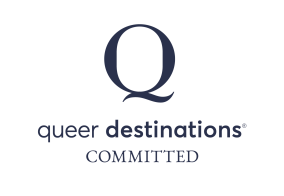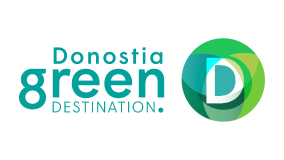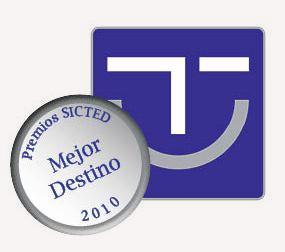Who we are
Presentation
Municipal enterprise "San Sebastián Turismo-Donostia Turismoa, S.A.", incorporated in 2006, is tasked with publicising, carrying out and fostering the social and economic activities that help implement sustainable tourism in Donostia / San Sebastián.
A wholly municipal enterprise working closely alongside the private sector, operating through the company associated with the public entity, adopting a common strategy and making annual contributions.
Objectives
Donostia Turismoa's main objectives are:
- To seek sustainable development in the city, showcasing its local identity, and coordinating the various organisations working alongside the destination.
- To create prosperity in the city, with a core focus on the welfare of its citizens.
- To provide visitors with a top-quality, authentic, satisfying tourist experience.
It has a framework plan to this end: Donostia / San Sebastián Sustainable Tourism Plan 2023 – 2027.
Donostia San Sebastián Turismoa management policy
The mission of Donostia San Sebastián Turismoa is to drive sustainable tourism development in Donostia / San Sebastián, enhance the city's identity, coordinate the destination's various stakeholders, and position it internationally through tourism planning and intelligence, destination management, development of tourism offerings, visitor service, promotion, communication, and marketing of products and services.
To this end, this management policy is established as a guiding framework for all its actions, based on five main strategic axes aligned with the Smart Tourism Destination methodology:
1. Participatory and Collaborative Governance
The entity is committed to leading a strong, transparent, and collaborative tourism governance that integrates public, private, and social stakeholders in the local tourism ecosystem.
2. Culture of Tourism Innovation
The entity is committed to continuous and systematic innovation in the provision of tourism services and the visitor experience.
3. Technology at the Service of Visitors and Management
Emphasis is placed on the use of technology as a key tool to improve the tourist experience and optimize destination management, with an intelligent and ethical approach.
4. Universal Accessibility and Inclusive Tourism
The entity is committed to accessible tourism for all, guaranteeing the right to enjoy the city on equal terms.
5. Environmental, Sociocultural, and Economic Sustainability
The entity prioritizes sustainable and inclusive tourism management that contributes to the well-being of citizens, preserves the natural environment, and strengthens local identity.
This management policy is reviewed annually and implemented through operational plans aligned with the city's strategy. The Donostia San Sebastián Turismoa team is responsible for its effective implementation, ensuring ongoing staff training and the constant improvement of management processes, indicators, and tools.
Functions
- To manage the destination, ensuring the city continues to be attractive, sustainable and balanced (visitors, local people and the tourism sector).
- To position the destination on the national and international front by means of segmented promotion.
- To create, develop and sell the local tourist product.
- To develop the professional and congress sector.
- To inform and serve those visiting us.
DSST strives to showcase the identity of the city, coordinate the various individuals and organisations involved and position it on the international stage, through planning and intelligence, management of the destination, development of the offer, provision of services for travellers, promotion, communication and marketing of products and services.
We seek quality, not quantity, and to this end we strive to ensure that those who visit Donostia enable us to carry out an activity that is:
- 1. Socially, environmentally and economically sustainable.
- 2. Well balanced out among local citizens, visitors and the tourism sector.
- 3. Better quality of life as a place to visit and a destination.
- 4. Genuine, maintaining and sharing culture, the Basque language Euskara and traditions, and striking.
- 5. Participative and collaborative, building a space for encounters and collaboration among citizenry, visitors, public institutions and business.
Our courses of action are:
1. Regulate accommodation
Continuous analysis of tourist activity, organised on the basis of the city's districts for efficient management of the offer of accommodation, and limit or contain it if necessary.
2. Distribute visits throughout the year and throughout the territory
To do this, among other courses of action, we promote tourism beyond the high season, in an extremely segmented fashion targeting strategic visitors, positioning our city as a top-quality destination, focusing on sustainability and new areas of attraction in order to streamline other areas of the city and the territory.
3. Improve arrivals and mobility in the city
To this end, among other initiatives, we make the dynamics of the tourist sector part of the Sustainable Urban Mobility plan and encourage the use of the tourist bus and train, sustainable transport and dissuasive car parks.
4. Pay particular attention to conservation of the Old Town, the eastern section of additions to the modern city ("Ensanche"), the port and Gros
We have introduced regulations to control public spaces for the hospitality and retail sectors, and a plan to use public space to preserve quality of life and diversity in social, cultural and economic activities, particularly in the Old Town and in the most relevant areas of the city.
5. Maintain culture and our identity
We have introduced measures to promote Basque culture, the history and traditions of Donostia, and everything that makes the city special. We lend support to leading hospitality and retail outlets, and take measures to care for the city's remarkable heritage and its urban landscape, preventing visual pollution.
6. Take care of, extol and share Euskara
We roll out campaigns to showcase our language to our visitors, and in the sector, to encourage them to discover it and use it. We also promote Euskara in all our external formats (competitions, interactive contents for websites, social media etc.).
7. Segment targets and select strategic markets
We take a number of courses of action to move away from en masse tourism and select the targets we wish to attract, and our preferred positioning of the destination, in order to maintain the quality of life of the people of Donostia. We strive to attract events in keeping with the destination strategy to boost the city's positioning in terms of science, technology and innovation.
8. Make use of technology at the service of people
We have implemented various courses of action to utilise smart solutions and technology to boost the city's sustainable development, the quality of life of our local people, and quality for visitors. These include digitalisation of the sector and a boost to entrepreneurship and innovation, in a bid to set a standard for smart tourist destinations, and setting up a sustainable tourism observatory that will provide us with information to enable decisions to be made.
9. Encourage participation and collaboration
To bring about integral tourism calls for participation and collaboration by local people, our visitors, the tourism sector and the businesses involved. To this end we have set up a number of channels and courses of action to be exchanged and shared among all the profiles, in addition to initiatives to optimise coordination among the various organisations involved.
10. Make those who visit us part of maintenance and management of resources
Maintaining and managing tourism resources - beaches, promenades, monuments, museums etc. - are quite an effort for the entire population of Donostia. This is why we have established the need to create a tax for visitors, and so we make them part of the cost, to share out the burden more fairly, and use the proceeds to improve our city and, in short, encourage responsible usage of the resources available.
11. Encourage sustainability
Additional measures are under way to foster a sustainable kind of tourism from the social, economic and environmental perspectives.
- Encourage transition towards a climate-neutral city on the basis of sustainable mobility, applying the principles of the circular economy in the tourism sector.
- Introduce measures to reduce the environmental footprint, such as measuring and offsetting the carbon footprint, and also avoiding the use of plastic and wastage of food.
- Coordinate the tourism sector to drive social, sustainable, solidarity-conscious campaigns and initiatives.
- Create or attend international forums inviting reflection, consolidating Donostia / San Sebastián's leadership of the global conversation on tourism and sustainable development.
- Action to boost equality in the sector and at the destination.
- Continue to roll out an Accessible Tourism format, to ensure that it caters for all manner of needs, and position our city as an inclusive top-quality destination.
Structure
Those in charge
- Tourism Councillor: Olatz Yarza Garagorri
- Manager of Donostia Turismoa: Isabel Aguirrezabala Wurster
Board of Directors
The Board of Directors is the body for the permanent governance and management of the Company.
Board of Directors
- Mr. Jon Insausti - President
- Mr. Raúl Fernández Acha - Vice-president
- Ms. Vanessa Vélez
- Mr. Iñigo García
- Ms. Miren Albistur
- Ms. Olatz Yarza
- Mr. Jon Markel Ormazabal
- Mr. Victor José Lasa
- Ms. Laura Larrión
- Mr. Jesús Santamaría
- Ms. Nerea Aramburu
- Ms. Pilar Pascual
Advisory Board
This is the body which provides counsel to the Company's Board of Directors.
Sectors
- Alexis Mindegia (Complementary Services)
- Iker Goikoetxea (Infraestructures)
- Iñigo Ansa (Tourist Services)
- Laura Larrión (Travel agencies and DMC's)
- Jesús Santamaría (Gastronomy)
- Maite Aizpuru (Organization of events, meetings and incentives)
- Nerea Aramburu (Shops)
- Oscar Iparraguirre (Transports)
- Pilar Pascual (Museums, culture and leisure)
- Raúl Fernández Acha (Accomodations)
Donostia San Sebastián Tourism Plans
As part of our commitment to sustainability, we have the Green Destination label, which gives visibility to all the city's environmental, social and cultural initiatives. We also have a plan dedicated to the promotion of Basque, our language. We are also proud to be a Queer Destination, as inclusion and respect are part of the essence of Donostia. Not forgetting the Equality Plan, a practical tool that guides the entity in terms of equality between men and women, promoting the participation of all people and encouraging actions adapted to the needs of both staff and those who use the services offered.


High-quality destination
From the moment that Donostia San Sebastián Turismoa was created, the company made a major commitment to getting San Sebastián recognised as a tourist destination based on the core values of creativity and excellence.
The work to make San Sebastián a high-quality destination includes SICTED and SMART BUSINESS (ICT) programmes.
CODE OF ETHICS

The objective of the Basque Country's Code of Ethics for Tourism (Código Ético del Turismo de Euskadi) is to make all tourism organisations take social responsibilities and environmental and economic sustainability on board as part of their daily round.
The Basque Country's Code of Ethics for Tourism adapts to the principles of the World Tourism Organization's Global Code of Ethics and the UN Agenda 2030's Sustainable Development goals; together with the particularities of the Basque Country and the specific characteristics of our culture.
By signing this Code, tourist organisations undertake a major commitment of respect for and conservation of local tradition and culture and the components of cultural heritage, which will go hand in hand with incentives for local communities to associate themselves with tourist activities and reap their economic, social and cultural benefits, particularly with regard to employment.
The signatory organisations make up the Basque Country's Tourism Ethics Register. The Basque Country's Committee on Tourism Ethics will be charged with managing and updating this register.
SICTED

SICTED is a methodology that provides a comprehensive, ongoing quality management system in a tourist destination with a new approach to expected results, a focus on continuous improvement, and an attitude of recovery and enhancement of resources and space. It is based on holistic knowledge about the destination and on the identification of common goals of the stakeholders involved.
Since 2008, Donostia San Sebastián Turismoa has participated in the SICTED (Integral System for Quality Tourism in the Destination, named after its acronym in Spanish) project, making a major commitment to working towards the recognition of San Sebastián as a high-quality destination. Unsurprisingly, we won the SICTED 2010 Best Tourism Quality Destination Award in 2010 (out of a total of 106 participating destinations), in recognition of our commitment to promoting, driving, and enhancing tourism quality in our city’s tourism companies and services. Likewise, San Sebastián also won SICTED 2013 Best Quality Manager Award, in 2014.
SAN SEBASTIÁN PREMIUM

Donostia San Sebastián Premium is a working line to transform the city of San Sebastián into a premium tourist destination, and provide an offer of tourism products and services alongside businesses operating in the sector which target this kind of customer.
Companies forming part of the project are entitled to a number of benefits, but they must adhere to certain requisites and undertakings in order to make Donostia San Sebastián a leading premium tourist destination.
EUSKADI GASTRONOMIKA

Euskadi Gastronomika is a network promoted by the Basque Government's Department of Trade, Consumer Affairs and Tourism and the Basque Tourism Agency, Basquetour, with the aim of articulating and guaranteeing the authenticity and excellence of the Basque Country's gastronomic tourism.
The network is made up of almost 800 companies of different typology: visitable agri-food industries and producers, activity companies, specialised tour guides and agencies, gastronomic accommodation, restaurants, markets and specialist shops. All of them with a common denominator: a commitment to local produce and Basque gastronomic culture to provide you with a truly complete and comprehensive offer to help you plan the best gastronomic experience.
